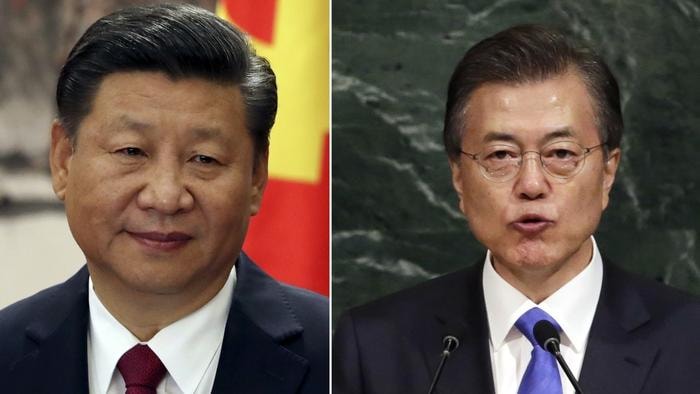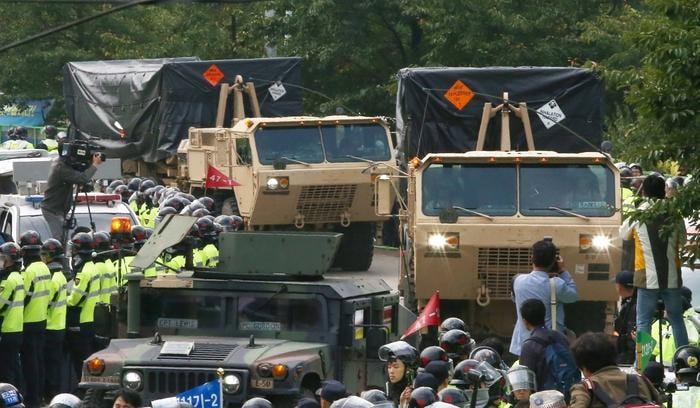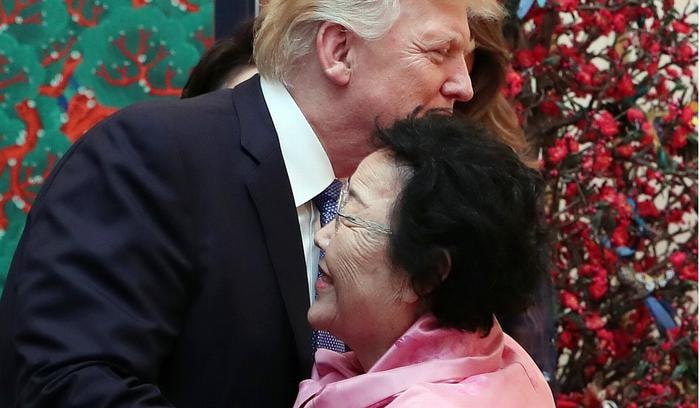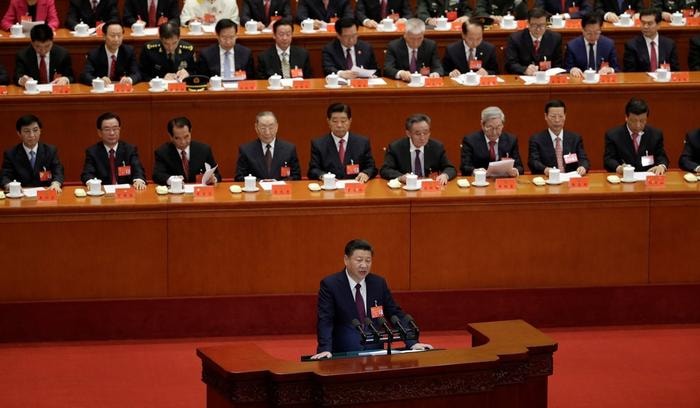China 'easily' wins over South Korea over THAAD
(Baonghean.vn)- The calm between China and South Korea may be good news for the South Korean economy and an important step towards resolving the North Korea issue. However, at the same time, this situation poses a risk of declining regional security in the coming years.
 |
| Chinese President Xi Jinping and South Korean President Moon Jae-in. Photo: AP |
On November 11, South Korean President Moon Jae-in and Chinese President Xi Jinping agreed to “normalize bilateral exchanges at an early date,” ending a dispute that erupted more than a year ago between Seoul and Beijing over the US decision to deploy the Terminal High Altitude Area Defense (THAAD) missile defense system in South Korea.
Specifically, Seoul agreed to take military restraint actions in exchange for Beijing lifting informal sanctions, setting a worrying precedent for China's rivals in the region.
The military restraints include the “Three Nos.” South Korea agreed not to deploy additional THAAD systems in the country, not to join the US missile defense system across the region, and not to join a military alliance between South Korea, the US and Japan. This is a huge sacrifice, but for economic and political reasons, President Moon has no other choice.
 |
| South Korean protesters blocked two vehicles carrying THAAD equipment in Seongju. Photo: EPA |
Mr. Joseph E.Yi, Professor of Political Science and International Studies at Hanyang University (South Korea) said: "President Moon Jae-in is a left-wing politician who tends to believe that 'the enemy of my enemy is my friend', so South Korea hates Japan and feels closer to China for historical and political reasons."
This expert stated: “The left wing in Korea has anti-Japanese ideology and a post-colonial perspective, considering China and Korea as opponents of Japanese colonialism.”
However, according to Mr. Yi, this depends on how the past is viewed. If Koreans see themselves and China as victims of oppression under Japanese colonialism, they will be more sympathetic to China. However, Mr. Yi notes that the problem here is that Japan today is not the country it was 60-70 years ago, and neither is China.
 |
| US President Donald Trump hugs Lee Yong-soo, a former “comfort woman”. Photo: EPA |
“If you see Japan as an unrepentant and evil colonial power, you should ally with China against Japan,” Professor Yi said. “So when President Moon met (US President Donald) Trump, instead of trying to develop a stronger alliance between South Korea, Japan and China, Moon introduced a ‘comfort woman,’ and they had Dokdo shrimp.” Relations between Tokyo and Seoul have been strained over the comfort women issue and the dispute over the sovereignty of the Dokdo Islands, which Japan calls Takeshima.
“President Moon wants to atone for the past. He wants the Japanese prime minister to apologize, and I think focusing on the past like this is shaping politics in a negative way,” Yi said. “The ‘Three Nos’ set a precedent that connects economics with politics and national security. South Korea would never do that if it were any other country, like Vietnam or Japan, but they are doing it for China because otherwise, the only option left is to form an alliance with Tokyo, and that is not an option for the left.”
According to Mr. Donald Emmerson, Director of the Southeast Asia Program at Stanford University (USA), there is growing skepticism about China's plot to isolate Japan and restrain South Korea's military options.
 |
| Chinese President Xi Jinping speaks at the 19th National Congress. Photo: Reuters |
Mr Emmerson noted that President Xi Jinping, in his speech at the 19th National Congress of the Communist Party of China in October, stressed that China had “entered a new phase” and must “take center stage in the world”, meaning Beijing’s expansionist ambitions were not extending to Europe. According to him, China “wants to dominate its immediate periphery”.
Referring to the Philippines’ lawsuit against China at the international arbitration court regarding the East Sea dispute, expert Emmerson said: “China is angry. They criticize the Philippines and impose economic sanctions, similar to what happened to Lotte Group in (China) after the THAAD incident in Korea. According to Beijing, the idea is to cause economic damage until the remaining government behaves properly”./.
Lan Ha
(According to SCMP)
| RELATED NEWS |
|---|
